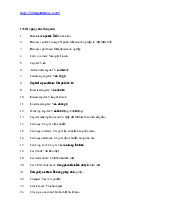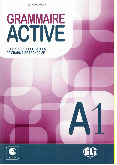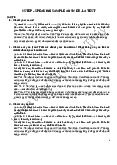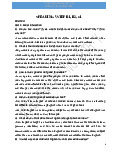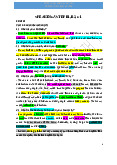



Preview text:
REVISION Task 1 Swimming with seals
The UK is home to half the world’s population of grey seals and there _____ many 0 local boat
trips offering sightseeing tours out to the islands and sandbanks (1) __________ the animals are most regularly found.
But if you really want to get close (2) the _________
seals and understand something about
their way of life, then you need to go on an underwater seal-watching trip. On these trips, you
have the chance to go over the side of the boat and, equipped (3)___________ a wetsuit, mask
and snorkel, spend time in the water alongside the animals.
Seals are extremely inquisitive creatures and, once you’re in the water, they will swim past you trying to work who (4)___________
you are and (5)__________ you’re doing
there. (6)____________ they can appear shy at first, seals soon (7)____________ used to you
being in the water, and will come and play around you. Young pups especially like
to (8)___________ contact with divers, and often use their teeth, gently biting masks, fins and
cameras out of curiosity. It can be a thrilling experience. Task 2 Tourism
Tourism is one of the world's largest industries, and it is the fastest growing. It
contributes over £50 billion to the economy annually, over £12 billion of it from overseas
visitors. About 25 million overseas visitors ………... (1)
Britain each year. Tourism is one of
the biggest employment (2).……….. in the UK, too – it employs over 1.7 million people, which
is more than in the construction or health service industries.
Around 20% of all new (3) ………...
are in this industry. These figures are very
impressive, but how do they translate (4) . ……….. job possibilities for you? There is room in
this industry for all sorts of people, with different educational ...……… , personal (5) attributes,
interests and career aims. A tourist is really a traveller – someone who (6) ………... a journey, usually for recreation, .……….. (7) a holiday or sightseeing. .
(8) ……….. , tourism at its very
simplest refers to the industry that provides travel and entertainment facilities for people away from their own homes. 1. A) come from B) come to C) come away with D) come down to 2. A) zones B) sections C) districts D) sectors 3. A) works B) jobs C) employments D) vocations 4. A) into B) from C) for D) at 5. A) surroundings B) traditions C) backgrounds D) settings 6. A) makes B) does C) performs D) breaks 7. A) as B) such C) so D) like 8. A) Although B) Despite C) Therefore D) Because Task 3 Task 4
You are going to read some extracts about the fears or challenges that several people have
faced. For questions 1-10, choose from the people (A-D). The people may be chosen more than once. Which person…
1. did not receive help willingly at first?
2. did not realise how difficult something would be?
3. did not feel a need to change?
4. helped others while being challenged?
5. can rely on a family member who does not share their phobia?
6. was afraid of being unsuccessful?
7. felt a sense of great happiness while taking part in an extreme activity?
8. initially tried to overcome his/her difficulty alone?
9. took advantage of an offer which had conditions attached to it?
10. had the support of a friend?
Confront your fears and face your challenges A Katie
I’m afraid of spiders. You won’t hear me scream, but I will certainly get out of the room until
someone else has dealt with it. Once, when I was a teenager, and my parents were both working
late, I sat on the front steps of the house for nearly five hours waiting for help. There was a
spider on the ceiling in the hallway, you see! I couldn’t get into the house! My father was quite
angry with me when he got home; he thought I needed to learn to be more independent. “How
will you ever survive if you have to live alone some day?” he asked. Well, I’m sure if I had to I
would just deal with it, although it would be a challenge. But I’ve never had to live alone. I had
flatmates at university, and now I’m married. Luckily my husband has no problem with spiders, and is tolerant of my phobia! B Ellie
The most challenging thing I’ve ever done, by far, was trekking in the Himalayas. It was
something I’d always dreamed of doing and I was incredibly fortunate to have the opportunity
to join a trek for charity. I always considered myself fit; I mean, I go to the gym two or three
times a week. But as soon as we set out I realised I was quite out of my depth; I’d never even
carried a pack before. In retrospect, I can’t imagine what I was thinking. On the first day, we
had a six-hour walk and after four hours I was so exhausted I felt that I couldn’t go on. I took
off my pack, sat down, and cried. Apparently my reaction was fairly common so our group
leader knew just how to deal with it. He calmly explained that we were only two more hours
from our first camp, while I’d have to walk for four, alone, to go back! I had no choice. I had to
continue. So I did, and when we eventually reached Everest base camp it was the proudest I’ve ever been. C Daniel
After high school I was accepted into a very good music school, by merit of my audition. I
almost declined; I didn’t want to go to university. It was a terribly difficult time because
nobody could understand why I would make that decision. I was just so terrified that I would
fail. I’m dyslexic, and I knew that even if I were studying music I would have to write essays
for so many classes. I’d had some teachers in the past that were convinced that I was just
careless, that I was lazy, when in fact I was spending much more time on the assignments than
my classmates. In the end I went, but I had a terrible attitude. I missed a lot of classes; I wasn’t
even trying. Eventually I found my way to an office that offered support to students with
special needs; I think someone told me that I could get a free computer, or something. That
turned my life around. To get the computer I had to attend regular meetings with an advisor,
which I hated at first, but eventually I learned to recognise my strengths and be realistic about
my weaknesses; I realised I could get help when I needed D Jack
My fear of heights was affecting my life because I had difficulty going up and down stairs or
over bridges, particularly if I could see down, beneath me. I would just get paralysed. I would
feel nauseous, and my feet would feel heavy, as if they were made of lead. I had read that it was
possible to get over phobias by exposure, so I put myself into difficult situations on purpose. It
was exhausting, but I knew it was important. I noticed slight improvements, but only very
slight. It was frustrating. Then I had the idea; I was going to try bungee jumping. I got a trusted
friend to go with me; to make sure I didn’t change my mind. He told the people in charge they
would have to push me, because I wouldn’t jump. It was all very fast; there was no time to
think. The feeling was exhilarating, to be honest. And I’ve had no trouble in my day-to-day life
since then. Though, I admit, I have no desire to do it again. Task 5 MAKING MIRRORS
Jane Thomas, together with her husband Clive, returned to Britain after nearly 30 years of
living abroad with wonderful memories. She also brought back a huge collection of sea shells
collected from beaches around the Indian Ocean.
Determined to use them rather than just keep them in a box or throw them out. Jane made
a shell mirror for her bathroom. 1 ………… Before long, she was being asked to make mirrors for other people.
That was two years ago. Jane now runs her own small mirror-making business. She buys
shells from all over the world through a wholesale company and has converted a spare
bedroom in her house into an office-cum-studio. 2 ..................
A local carpenter makes frames for her and a glazier then fits the glass inside. Jane does
everything else herself: the design, the initial painting of the frame and then the final
making up. 3 ...............
Clive is a banker and was able to advise Jane on deciding how much money should be
invested when she decided to set up the business. Around £ 3000 was spent on shells
alone. 4 ................. Jane’s main problem was knowing how to market her work more widely.
Local shops could only sell a small number because once they had added their profit
margin, the mirrors became rather expensive. However, Jane has now made contact with
another company that makes and sells mirrors of a different type. Together they can afford to
take stands at specialist exhibitions and craft fairs. 5………….
Venturing into other areas, Jane plans to approach restaurants and hotels directly as she thinks
her mirrors might be attractive to them. She has also taken a website on the Internet. This is a
very economical way of selling. It means Jane doesn’t have the expense of travelling around
with her range of mirrors in the back of the car.
Jane reckons it will take another year before her business starts to make money. 6 ........
She would like to employ someone to help her with the administration and preparation of
the frames, for example, which would allow her to devote more time to the artistic side.
A. At such events, the right sort of people get to see the mirrors and can order them directly.
B. This represents about one week’s work and each mirror brings in anything between
£ 100 and £ 400 for the business.
C. As Jane discovered, it’s a good idea to find a company willing to sell goods on your behalf.
D. This was very much admired by friends and neighbours who came to visit her.
E. But it didn’t end there, Jane also had to think about equipment such as the heavy-duty
boxes needed to send the mirrors abroad.
F. She works there, surrounded by shells of every shape and colour and the other materials needed to make the mirrors.
G. Once this happens, she feels she will be able to concentrate on the side of the business she enjoys.
